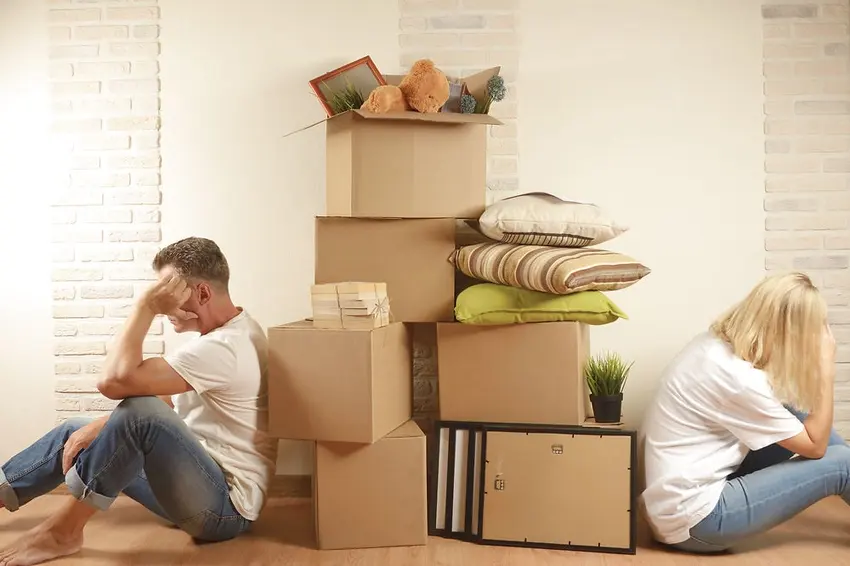Moving to a new house can be an exciting adventure, but it also comes with its fair share of stress and challenges. From packing up your belongings to adapting to a new environment, there are many things that can make the process overwhelming. However, with proper planning and organization, moving house doesn’t have to be a stressful experience. In fact, it can even be an opportunity for personal growth and new beginnings.
In this article, we will explore some helpful tips and strategies to make your moving process as smooth and stress-free as possible. We’ll discuss everything from decluttering and packing to dealing with the emotional aspects of leaving your old home behind. Whether you’re a first-time mover or have relocated multiple times, this guide is sure to offer valuable insights and advice to make your move a positive and enjoyable experience. So let’s dive in and discover how you can make moving house less stressful!
Strategies for Reducing Moving Stress
Here are some practical strategies to help you manage the stress of moving:
Start Planning Early:
One of the most important things you can do to reduce moving stress is to start planning early. Moving is a complex process that involves many tasks and decisions, and trying to rush everything at the last minute will only lead to more stress. Ideally, you should start planning at least 8 weeks before your move date.
The first step in your planning process should be creating a moving checklist. This will help you stay organized and on track with all the important tasks that need to be done before, during, and after your move.
Declutter and Simplify:
Moving is the perfect opportunity to declutter and get rid of items you no longer need or use. Not only will this save you time and energy during the packing process, but it will also help reduce the number of belongings you need to move, ultimately making your move less stressful.
Before starting to pack, go through each room in your house and sort items into categories: keep, donate, sell, or throw away. Be honest with yourself and only keep the things that serve a purpose or bring you joy. As for the rest of the items, consider donating them to charity or having a garage sale to make some extra cash.
Hire Professional Movers:
While it may be tempting to save money by moving on your own, hiring professional movers can greatly reduce your stress levels. They have the experience and equipment to handle all your belongings with care and efficiency, leaving you free to focus on other aspects of the move.
Do your research and choose a reputable moving company that offers insurance coverage for your items. This will give you peace of mind knowing that your possessions are in good hands.
Take Care of Yourself:
Moving can easily take a toll on your physical and mental well-being, so it’s important to prioritize self-care during this time. Make sure you get enough rest, eat well, and stay hydrated. Take breaks when needed and try not to overexert yourself.
Additionally, make time for activities that bring you joy and help you relax. This could be anything from taking a walk in nature to practicing yoga or meditation. Taking care of yourself will not only reduce your stress levels but also help you stay energized and focused during the moving process.
Keep a Positive Attitude:
As with any major life change, moving can bring about mixed emotions. It’s normal to feel sad or anxious about leaving your old home behind, but it’s important to focus on the positive aspects of your move and embrace the new opportunities that await you.
Instead of dwelling on what you’re leaving behind, try to envision the exciting possibilities that come with a new house and neighborhood. Keep an open mind and remember that this is a fresh start for you and your family.
Tips for Settling into your New Home
Moving is not just about the physical act of transporting your belongings from one place to another, but it’s also about adapting to a new environment. Here are some tips to help you settle into your new home:
Unpack Room by Room:
Unpacking can be a daunting task, but the key is to tackle it one room at a time. This will not only make the process more manageable, but also help you get settled in quicker. Start by unpacking essential items that you’ll need immediately, such as toiletries, kitchen essentials, and bedding. Then move on to other rooms in a systematic manner.
It may be helpful to label your boxes according to the room they belong in, so you can easily identify what needs to go where. While unpacking, take the time to declutter and organize as you go. This will prevent unnecessary clutter from building up in your new home and help create a calm and functional living space.
Get to Know Your New Neighborhood:
One of the best ways to feel more at home in your new house is to explore and familiarize yourself with your new neighborhood. Take a walk or drive around and check out local shops, restaurants, parks, and other points of interest. This will not only help you get a sense of the community but also make it easier to find things you need in the future.
Additionally, consider attending events or joining local groups to meet new people and make connections in your new neighborhood. Building relationships with neighbors can also be helpful for getting recommendations on things like the best pizza place or a reliable handyman.
Make it Feel Like Home:
Adding personal touches to your new home can greatly enhance its sense of comfort and familiarity. Unpack sentimental items like photos, artwork, or souvenirs and display them in your new space. This will not only make you feel more at home but also add character to your new house.
You can also recreate familiar routines or traditions from your old home to help you adjust to your new surroundings. For example, if you used to have a relaxing evening ritual of reading in your old living room, try to incorporate this into your new home as well.
Be Patient:
Adjusting to a new home and neighborhood takes time, so it’s important to be patient with yourself and your family during this transition. Don’t expect everything to feel familiar and comfortable right away. Give yourself time to adapt and get used to your new surroundings.
Remember that moving is a big change, but it also brings exciting opportunities. Embrace the journey and trust that with time, your new house will start to feel like home.
Seek Support:
If you find yourself struggling to adjust or feeling overwhelmed, don’t be afraid to seek support. Talk to family and friends about how you’re feeling or consider seeking professional help if needed. Moving can be emotional and it’s important to take care of your mental health during this time.
Additionally, reach out to new neighbors or join local groups for support and camaraderie. Having a support system in your new neighborhood can make a huge difference in how quickly you settle into your new home.
Common mistake to avoid when moving:
Here are some common mistakes people make when moving and how to avoid them:
Not planning ahead:
One of the biggest mistakes people make is not giving themselves enough time to plan and prepare for the move. Moving can be a complex process, so it’s important to start early and create a detailed timeline of tasks to complete before the moving day.
Not budgeting properly:
Moving can be expensive, and many people underestimate the costs involved. Make sure to budget for not just hiring a moving company, but also for things like packing materials, storage fees, and any unexpected expenses that may arise.
Not decluttering before the move:
Moving is the perfect opportunity to declutter and get rid of items you no longer need. Don’t make the mistake of packing and moving unnecessary items to your new home. Take the time to declutter and donate or sell any unwanted belongings.
Not labeling boxes:
As mentioned earlier, labeling boxes according to the room they belong in can greatly simplify the unpacking process. Don’t make the mistake of not labeling your boxes or writing vague labels like “miscellaneous”. Be specific and detailed when labeling so you know exactly where each box should go.
Not taking care of valuable items:
During the chaos of moving, it’s easy to forget about fragile or valuable items. Make sure to properly pack and label these items and consider transporting them yourself instead of leaving them with the movers.
FAQs
How can I make the entire process of moving house less stressful, and what steps should I take to start packing efficiently?
Discover strategies to make your house move less stressful by starting the packing process at your own pace. Learn about the importance of packing supplies like packing tape and how to efficiently begin packing. Explore tips for creating a to-do list and organizing the entire process to ensure a stress-free move. Consider the benefits of hiring a professional removals company to further ease the burden.
What items should be included in a moving day survival kit, and how can it contribute to a stress-free move?
Ease the stress of moving day by preparing a moving day survival kit. Learn about essential items, including packing supplies, important documents, and cleaning supplies. Understand how having these items readily accessible can streamline the moving process and contribute to a stress-free move. Consider the role of a professional removals company in ensuring a smooth transition.
How can I maintain a stress-free move by packing at my own pace and organizing important documents efficiently?
Explore the benefits of packing at your own pace to maintain a stress-free move. Learn about the importance of organizing important documents and utilizing packing supplies like packing tape. Discover how a well-structured to-do list can contribute to a smooth house move. Consider the support of a professional removals company to handle the logistics, making the entire process less daunting.
Conclusion:
Moving to a new home can be both exciting and overwhelming. By following these tips and avoiding common mistakes, you can make the transition smoother and settle into your new home more easily. Remember to keep an open mind and embrace the new opportunities that come with moving to a new place.
With time, your new house will start to feel like home. So, this was all about how you can successfully settle into your new home. We hope these tips will help you make the most out of this transition and turn your new house into a comfortable and happy home.






